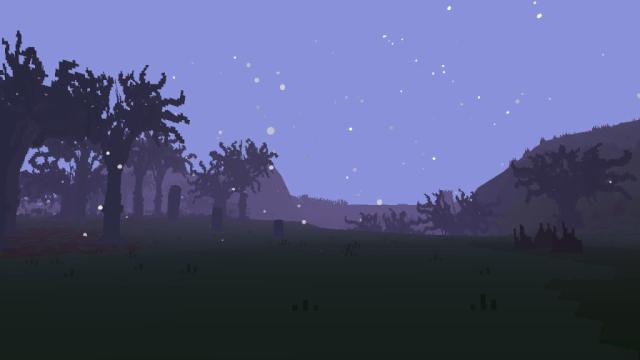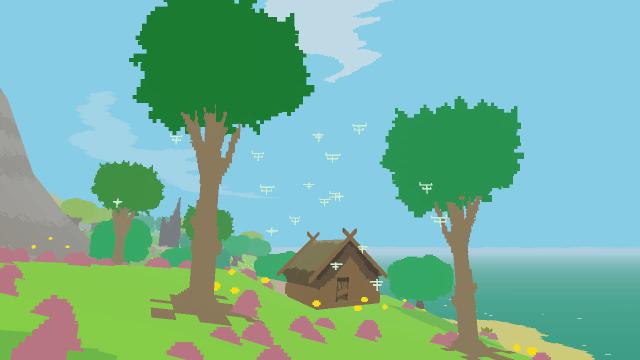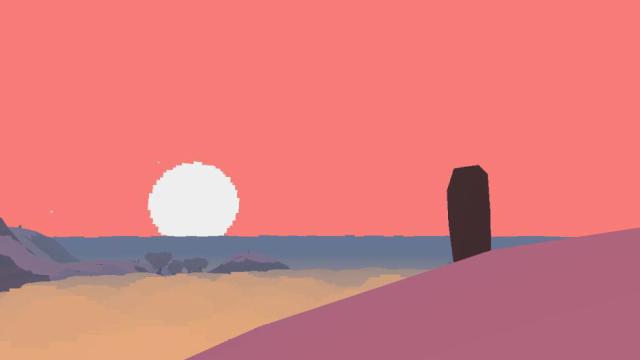
Proteus kicks off with you waking up in the sea facing an unknown island with no idea what you’re looking for, no idea what you’re meant to be doing and no idea if you’ll ever manage it. There’s no story, no enemies, no danger and the potential to play for hours and never actually get anywhere. And you know what? It’s utterly, utterly spellbinding.
It’s a fitting start to a game that share its name with one of the Greek Gods of the Oceans, and yet beyond the opening moments the water serves as nothing but a reminder of where the edge of your new oasis lies, the boundaries to your exploration and discovering. Beyond the opening seconds your island is everything you will be focussing on, an island that you’ve never seen before and once you close your eyes and drop back to the main menu, you’ll never see again. Each island you see is a randomly generated mini-world, with mountains you can climb in seconds, animals that hop about and coax you into following them and trees that drop leaves and blossoms depending on which season you’re enjoying.

All of this happens using a deceptively beautiful low-resolution visual effect, which dispute its simplicity portrays a crystal clear picture of your surroundings. You’ll always start in the springtime with weather and surroundings matching the time of year, you’ll always see certain structures or areas somewhere on the island, and you’ll always have plenty of places to roam, paths to follow and interesting looking mountains to climb for a better view. Various times of day also bring about the possibility of some amazing colour changes – in one memorable moment I walked to a specific location at a specific time during a specific season. It was a total accident, something I didn’t even think about while I was doing it, and the results were astounding. The sky turned a blood red colour, the land around me became black, and in those exact surroundings it felt like I’d awoken the devil. And yet walking away brought the world back to normal tranquillity. It was incredible.
When night comes – and it will on a regular cycle – stars will come out, the moon will pass through the sky and mysterious lights will descend on the island, gathering in a key area which serves as a method to move the game forwards. I won’t tell you what it is – in Proteus, discovery is everything – but stand back slightly from the magical area though and time will fly by, with days and nights passing in seconds as the world passes by at high speed. It’s an entirely pointless waste of time, all except from the fact it’s utterly compelling to watch, and brings to a head the biggest part of Proteus: the music.

Whether you’re sat on the beach looking out to sea while the sun sets over the horizon, wandering down a path in winter between bare trees or chasing a rabbit across the island the music builds, softens and generally sweeps over you in tandem with your environment. David Kanaga’s electronic compositions not only perfectly suit your gentle, slow explorations but actually enhance the experience in such a way that it quite simply makes the game. With a less impressive soundtrack, Proteus would be far less of a spectacle.
As many PSN games are nowadays Proteus is a cross-buy title, allowing both PS3 and Vita access, with the Vita version of Proteus having some exclusive features. The main extra is the ability to have an island randomly generated based on where you currently are in the real world using the GPS in the 3G model, giving a new way to generate the randomness of the island. Quite how much this adds to things remains to be seen, but it’s certainly an interesting feature to have on board.
You’re also able to interact with the world via the Vita’s rear touch panel. When on the island and having a sit down, placing one finger on the back panel and moving it around grants you the ability to remix the color pallet of the game. Swiping two fingers vertically also lets you manipulate time, allowing you to speed up the day night cycle. This allows for some gorgeous tranquil moments like stopping the rain falling mid flow and walking through it. Two fingers moving horizontally even allows you to change the wind direction and strength, helping you to move along any low level clouds that are interfering with your exploration of the island. The game also takes use of the gyroscope in the Vita, using it to control what you are looking at rather than using the right analog stick. We found this to be an interesting way of getting around in the game but not very practical when sat down, so soon returned to using the analog stick.

All in all it feels strange even calling Proteus a game; sure it has a beginning, a middle and an end but so does a book, a film and a trip to the dentist. What might describe it better is a meditation; an experience in relaxation, discovery and wonder. I nearly fell asleep a couple of times playing this late at night – not because I was bored, and not because I was tired, but because in a darkened room with headphones on it totally zoned me out and put my mind somewhere that wasn’t my living room. That’s pretty remarkable. Even when you think you’ve seen it all, the end of the game happens and your mind is blown all over again with some bewilderingly beautiful moments as you begin to close your eyes at the end of your journey. Admittedly it’s not the type of game you’ll come back to on a daily basis for the next 6 months and at a pinch under £10 it’s not the cheapest PSN title going, but if you’re the type of person who needs an excuse to unwind and have no choice but to chill out for an hour, or just want to see just what a cleverly developed soundtrack can add to a game, then you’re in just the right place.
Reviewed on PS3


Love the look of this, sounds like a really memorable game!